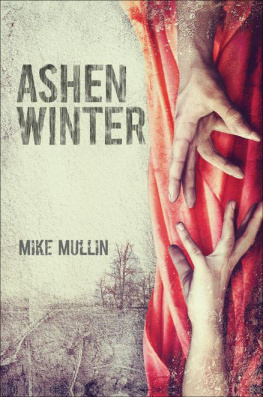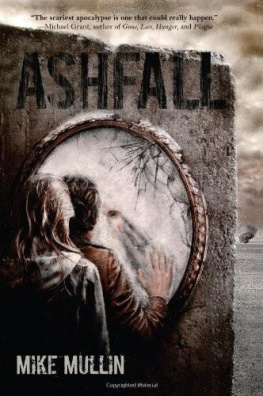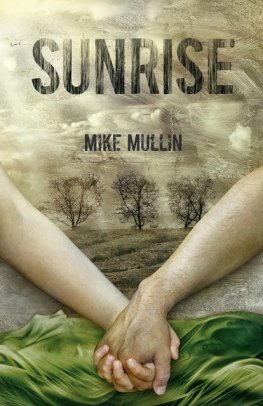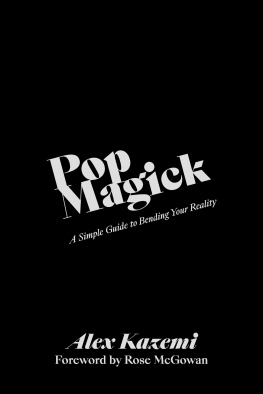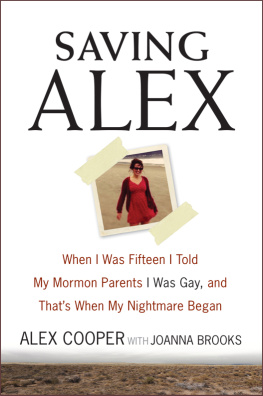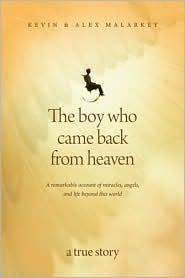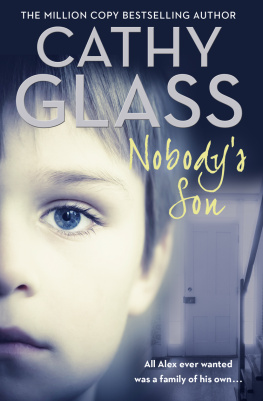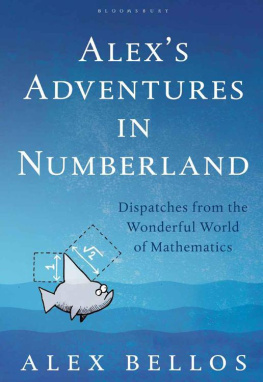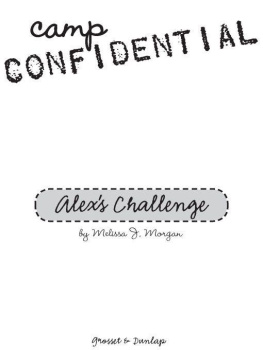

By Mike Mullin
Tanglewood Terre Haute, IN
Published by Tanglewood Publishing, Inc., 2012
Text Mike Mullin 2012
All rights reserved. Neither this book nor any part may be reproduced or transmitted in any form or by any means, electronic or mechanical, including photocopying, microfilming, and recording, or by any information storage and retrieval system, without permission in writing from the publisher.
Cover photograph by Ana Correal
Design by Amy Alick Perich
Tanglewood Publishing, Inc.
4400 Hulman Street
Terre Haute, IN 47803
www.tanglewoodbooks.com
10 9 8 7 6 5 4 3 2 1
ISBN-13: 978-1-933718-84-2
Library of Congress Cataloging-in-Publication Data
Mullin, Mike.
Ashen winter / Mike Mullin.
p. cm.
Summary: More than six months after the eruption of the Yellowstone supervolcano, Alex and Darla retrace their steps to Iowa hoping to find Alexs parents and bring them to the tenuous safety of Illinois, but the journey is ever more perilous as the remaining communities fight to the death for food and power.
ISBN 978-1-933718-84-2
[1. Volcanoes--Fiction. 2. Survival--Fiction. 3. Science fiction.] I. Title.
PZ7.M9196Arm 2012
[Fic]--dc23
2012010148
For Mom
Contents
Ten months had passed since Id last seen the sun. The rich blue of that final August sky was fading from my memory. Colors are slippery: If you cover your eyes and try to remember blue, you see black. Now we had a yellowish gray sky, dark as a heavily overcast day. Darla said Yellowstones eruption had hurled billions of tons of fine ash and sulfur dioxide into the stratosphere, and it might be years before the sky returned to normal. I said the dim light was depressing.
In April, we prayed for a break in the winter, a warm spell to melt the four-foot blanket of snow smothering my uncles farm. But April was colder than March, May colder still. In June, the mercury in the Farmall tractor thermometer hanging outside the kitchen window fell below zero and stayed there. Every day we watched the thin red line try to claw its way to zero. Every day it failed.
No more snow fell, but none melted, either. Wed run out of Chapstick months before. For a while we all wore my Aunt Carolines lipstick, but now that was gone, too, and our lips were cracked and bloody from the dry winter air. The storms that had followed the eruption had spent their fury, and drought clutched us in its dry fist. My world was frozen, desiccated, and dead.
I was always cold. Cold as I worked during the daycutting wood, hauling snow to melt for water, or digging for the corn buried under the snow and ash. Cold when I went to bed. Cold when I got up in the morning despite Darla snuggled against my side.
Before the volcano, if youd told me that Id be sleeping every night beside a girl I loved, Id have said you were crazy. Mom wouldve filleted me and served the choice bits as hors doeuvres if Id ever so much as closed the door with a girl in my room. Not that any girls wouldve wanted to be alone with me. Before I met Darla, Id had a total of one real girlfriend, and she dumped me before wed done much more than make out.
I still didnt think of myself as having a girlfriend. That word was too trivial for what Darla meant to me. When I met her on the road last year, I was bleeding, starving, and ready to give up. Ready to die. Without each other, we wouldnt have escaped from Iowa, from the devastation and chaos Yellowstone had caused. Now I wouldnt want to surviveto endure the desperate labor and daily frostbitewithout Darla.
But if Mom showed up now, fillet knife in hand, to scold me for sleeping next to Darla, Id hug her and savor every second of the scolding. She and Dad had left my uncles farm near Warren, Illinois, leaving my younger sister Rebecca there with my aunt and uncle. Darla and I had arrived at the farm in early October, five weeks after my parents had left to look for me. No one had seen or heard from them since.
And Mom wouldnt find me sleeping alone with Darla, anyway. In April, the falling temperature had forced us to abandon the upstairs bedrooms at my uncles. Now Darla and I slept in a clump with my aunt, uncle, two cousins, and sister on the living room floor near the fire. A night spent spooning with your girlfriend isnt nearly so exciting when your uncle is curled up against your other side.
We got the idea to sleep together from the duckstheyd been doing it all winter. But a few days after we started imitating them, one of the ducks on the outside of their pile in the barn froze to death. So we cleared everything out of the main floor guest room, adjacent to the living room, and started keeping the ducks and goats inside at night. Our sleep was occasionally interrupted by quacks and bleats. And I never got used to the stench of the billies. Male goats stink worse than skunks.
Earth to Alex, Darla said, drawing my attention back to the barn where we were working. Would the former planet known as Alex please come in?
Former planet? I asked.
Yeah. I demoted you.
Like Pluto? What am I now?
Um, a dwarf planet, I think?
Hey! Im not that short.
Whatever. Hold this wedge.
I took one of the wooden wedges wed just cut and held it against the crack between the runner and bedstones of our grain mill. Darla softly tapped the wedge in my hand with a hammer, barely inserting its tip between the stones. I picked up another wedge, and we worked our way around the mill, trying to pry the runner stone free with careful, even pressure.
Darla had built this bicycle-powered gristmill not long after we arrived at the farm. In the bitter cold the night before, the stones had frozen together. Now we were trying to separate them without cracking the runner stone. Replacing it would take more than a weeks labor.
Holding wedges for Darla left a lot of time to think. We were planning a birthday party for my cousin Max that night. He was turning thirteen. Everyone but Aunt Caroline and I had celebrated a birthday since I arrived on the farm. Darla had turned eighteentwo years older than I. Well, really just a year and a half.
While Darla and I worked on the gristmill, Max, Anna, and Rebecca were in the greenhouses caring for our crop of kale. It was worth its weight in gold nowmore, actually, since gold was almost worthless. You couldnt eat gold or build anything useful with it, after all. Kale, by contrast, would grow even if the temperature in the greenhouses got close to freezing. And kale has tons of vitamin C, the only cure for scurvy, which had become an epidemic since the eruption.
When the weather had grown so cold that even the kale started to die, Darla designed a wood-fired heating system for the greenhouses. She found a description of a similar system, a hypocaust, in one of my cousin Annas books, Built to Last . It had taken almost a month of back-breaking labor to build. A frozen dirt ramp led down to an enclosed oven-like space where we built a fire every night. A metal door with a small air intake covered the fire shelf. Smoke and hot air from the fire flowed up into a winding series of ducts buried under all three greenhouses, eventually escaping at the far side. That way, the fire heated the ground under our kale without filling the greenhouses with smoke. On the downside, we had to keep the fire outside the greenhouses burning every night.
So we had to cut more wood. Luckily, my uncles farm backed up against Apple River Canyon State Park. We never would have cut its trees in normal times, but now we had no choice.
Next page
